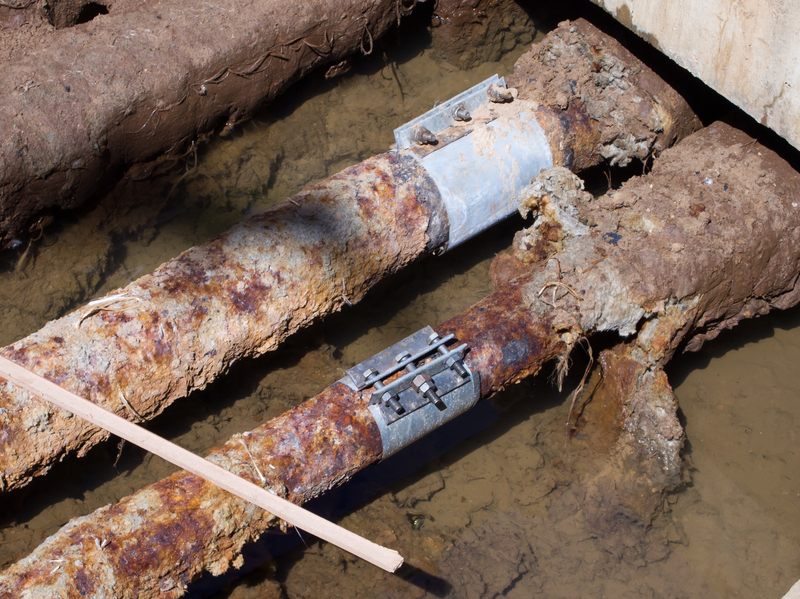Delaware Materials and Ethics 24 PDH Discount Package 1
Courses in this Package
Structures and Properties of Metals (T07-001)
Thermal Stress and Brittle Fracture of Material (T02-001)
Corrosion Control for Aircraft (T09-001)
Engineering Ethics for Delaware Professional Engineers (DE2-001)
Lubricants and Hydraulic Fluids - Overview (T04-008)

The online engineering PDH course addresses two aspects of metals. The first part of this course deals with the basic structures of metals and how those structures are affected by various processes. In addition, it contains information on the various imperfections and defects that the metal may sustain and how they affect the metal. The second part contains information on metal properties which are considered when selecting material for engineering design purposes. Each of these properties contains a discussion on how the property is affected and the metal's application.
This 7 PDH online course is applicable to structural and mechanical engineers, construction and design personnel, technical staff and facility operators who are interested in gaining a better understanding of the structures and properties of metals.
This PE continuing education course is intended to provide you with the following specific knowledge and skills:
- Understanding bonding
- Learning about common lattice types
- Understanding grain structure and boundary
- Learning about polymorphism and alloys
- Knowing the imperfection in metals
- Learning about stress and strain and Young's
- Modulus Understanding stress-strain relationship
- Understanding the physical properties of materials
- Learning about working metals and corrosion
- Understanding hydrogen embrittlement
In this professional engineering CEU course, you need to review Modules 1 and 2, "Structures and Property of Metals" of the Department of Energy Publication DOE-HDBK-1017/1-93, "Material Science".
Upon successful completion of the quiz, print your Certificate of Completion instantly. (Note: if you are paying by check or money order, you will be able to print it after we receive your payment.) For your convenience, we will also email it to you. Please note that you can log in to your account at any time to access and print your Certificate of Completion.

This online engineering PDH course addresses the effects of thermal stress and thermal shock on a system. It explains how thermal stress and shock combined with pressure can cause major damage to components. This course also addresses ductile and brittle fracture. It describes how ductile and brittle fractures are affected by the minimum pressurization and temperature curves. It also explains the reason why heatup and cooldown rate limits are used when heating up or cooling down a system.
This 2 PDH online course is applicable to structural and mechanical engineers, construction and personnel, technical staff and facility operators who are interested in gaining a better understanding of thermal stress and brittle fracture of materials.
This PE continuing education course is intended to provide you with the following specific knowledge and skills:
- Thermal stress
- Pressurized thermal shock
- Brittle fracture mechanism
- Minimum pressurization-temperature curves
- Heatup and cooldown rate limits
In this professional engineering CEU course, you need to review Modules 3 and 4, "Thermal Stress and Brittle Fracture" of the Department of Energy Publication DOE-HDBK-1017/1-93, "Material Science".
Upon successful completion of the quiz, print your Certificate of Completion instantly. (Note: if you are paying by check or money order, you will be able to print it after we receive your payment.) For your convenience, we will also email it to you. Please note that you can log in to your account at any time to access and print your Certificate of Completion.

This online engineering PDH course provides information regarding the identification and treatment of corrosive attack on aircraft structures and engine materials.
Corrosion is the electrochemical deterioration of a metal because of its chemical reaction with a surrounding environment. While the aerospace industry is continuously developing new and better materials, progress is offset partly by a more aggressive operational environment and by the complexity of the corrosion phenomenon, which can take many different forms. The resistance of aircraft materials to corrosion can drastically change with only a small environmental change.
This 9 PDH online course is applicable to material, industrial and mechanical engineers, as well as aircraft operators, maintenance and repair personnel in addition to all others seeking a better understanding of the basics of corrosion in aircrafts.
This PE continuing education course is intended to provide you with the following specific knowledge and skills:
- Familiarizing with the factors that cause corrosion
- Understanding the effects of corrosion
- Knowing which areas are prone to corrosion and the methods of prevention
- Learning the requirements for inspecting aircraft
- Learning corrosion removal techniques
Upon successful completion of the quiz, print your Certificate of Completion instantly. (Note: if you are paying by check or money order, you will be able to print it after we receive your payment.) For your convenience, we will also email it to you. Please note that you can log in to your account at any time to access and print your Certificate of Completion.

This online engineering PDH course presents the laws of professional responsibility governing the practice of engineering in the State of Delaware, as well as the Delaware engineering code of ethics as follows:
- Delaware Professional Engineers' Act: Title 24, Chapter 28
- Delaware Engineering Code of Ethics
Engineering ethics is (1) the study of moral issues and decisions confronting individuals and organizations involved in engineering and (2) the study of related questions about moral conduct, character, ideals and relationships of peoples and organizations involved in technological development (Martin and Schinzinger, Ethics in Engineering).
This 2 PDH online course is applicable to Professional Engineers licensed in the State of Delaware and who are required to demonstrate continuing professional competency in engineering ethics as a condition of their license renewal.
Every licensee is required to obtain the equivalent of 12 PDHs per year (or 24 PDHs obtained anytime during the renewal period). Of the 24 PDHs earned during the biennial renewal period: no less than 2 PDH and no more than 6 PDH shall be related to professional ethics, and no more than 9 PDH shall be related to business or project management. The balance shall be related to the licensee’s area of technical practice.
This PE continuing education course is intended to provide you with the following specific knowledge and skills:
- Understanding the statutory laws regulating the practice of engineering in the State of Delaware and their application to professional engineers
- Understanding the Delaware Engineering Code of Ethics promulgated by the Council of the DAPE to safeguard life, health and property and promote public welfare
- Learning about the engineering rules of professional responsibility and ethical conduct as well as understanding the basic obligations of the engineer
- Understanding the Delaware disciplinary process and the range of violations and corresponding penalties imposed by DAPE
Upon successful completion of the quiz, print your Certificate of Completion instantly. (Note: if you are paying by check or money order, you will be able to print it after we receive your payment.) For your convenience, we will also email it to you. Please note that you can log in to your account at any time to access and print your Certificate of Completion.

This online engineering PDH course describes the basic principles, characteristics, properties, and applications of different types of lubricating oils.
This course is intended to be a practical guide to lubrication with enough technical detail to allow personnel to recognize and easily discern differences in performance properties specified in manufacturers' product literature so that the proper lubricant for a particular application is selected.
This 4 PDH online course is applicable to engineers, design and construction personnel, and other technical professionals who are interested in gaining a better understanding of lubricants.
This PE continuing education course is intended to provide you with the following specific knowledge and skills:
- Understanding the definition of friction and mechanisms of wear
- Understanding the basic principles of lubrication
- Learning about the different types and characteristics of lubricants
- Familiarizing with the applications of lubricants
- Learning about the basics of the lubrication oil and the production methods
In this professional engineering CEU course, you need to review Chapters 2 through 4 of the "Lubricants and Hydraulic Fluids" engineering manual, published by the United States Army of Corps of Engineers (USACE), Publication Number EM 1110-2-1424, dated January 29, 2016.
Upon successful completion of the quiz, print your Certificate of Completion instantly. (Note: if you are paying by check or money order, you will be able to print it after we receive your payment.) For your convenience, we will also email it to you. Please note that you can log in to your account at any time to access and print your Certificate of Completion.